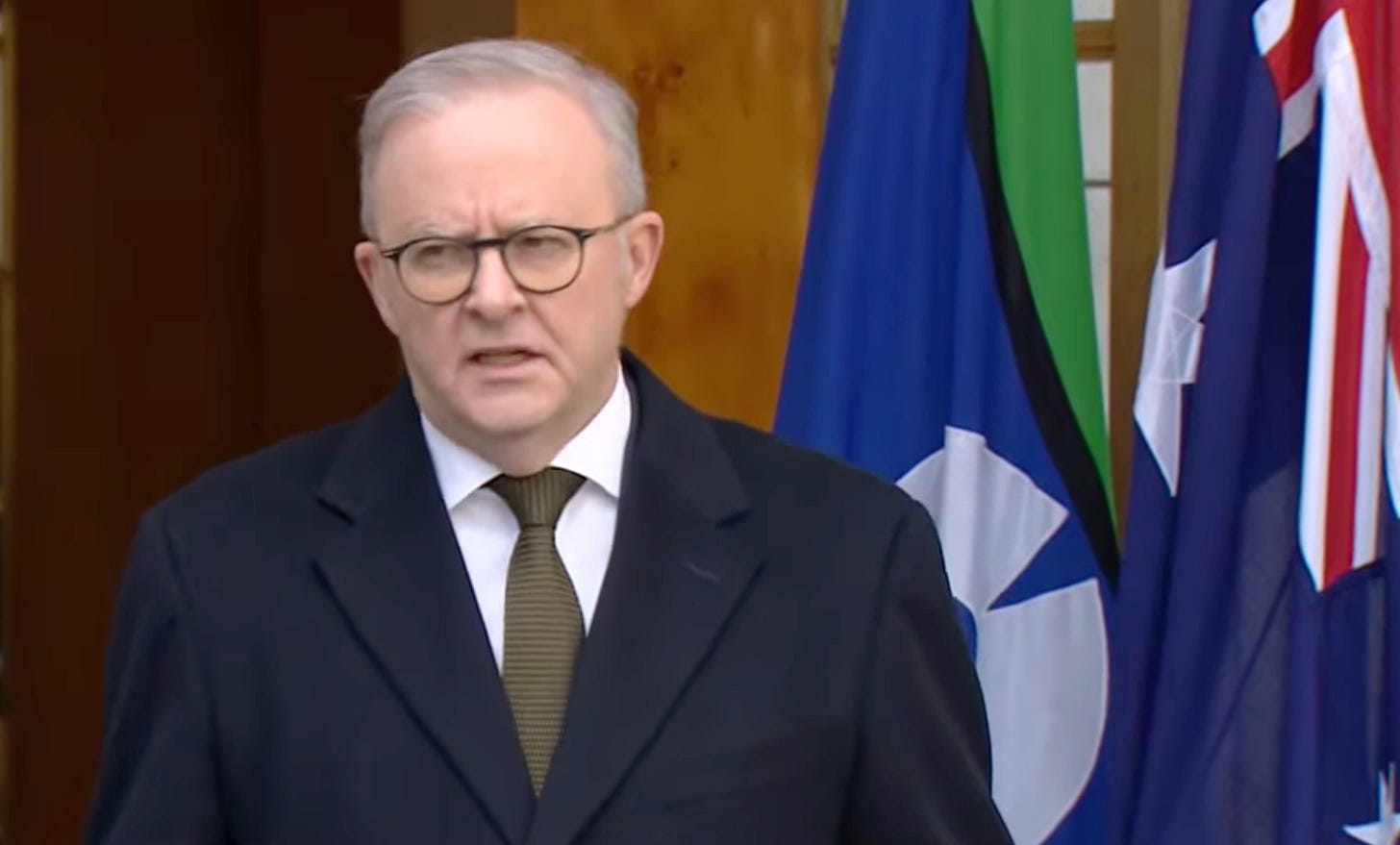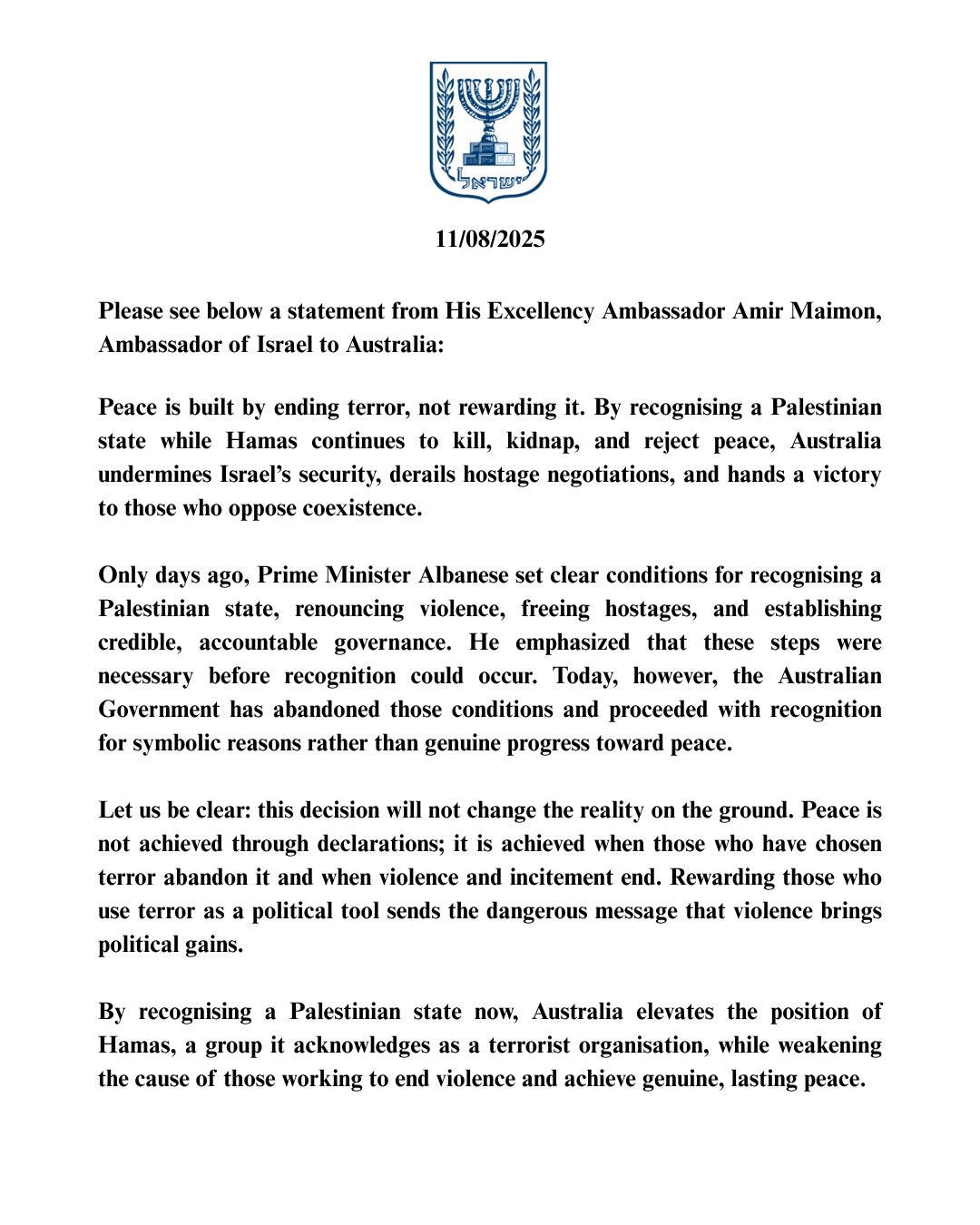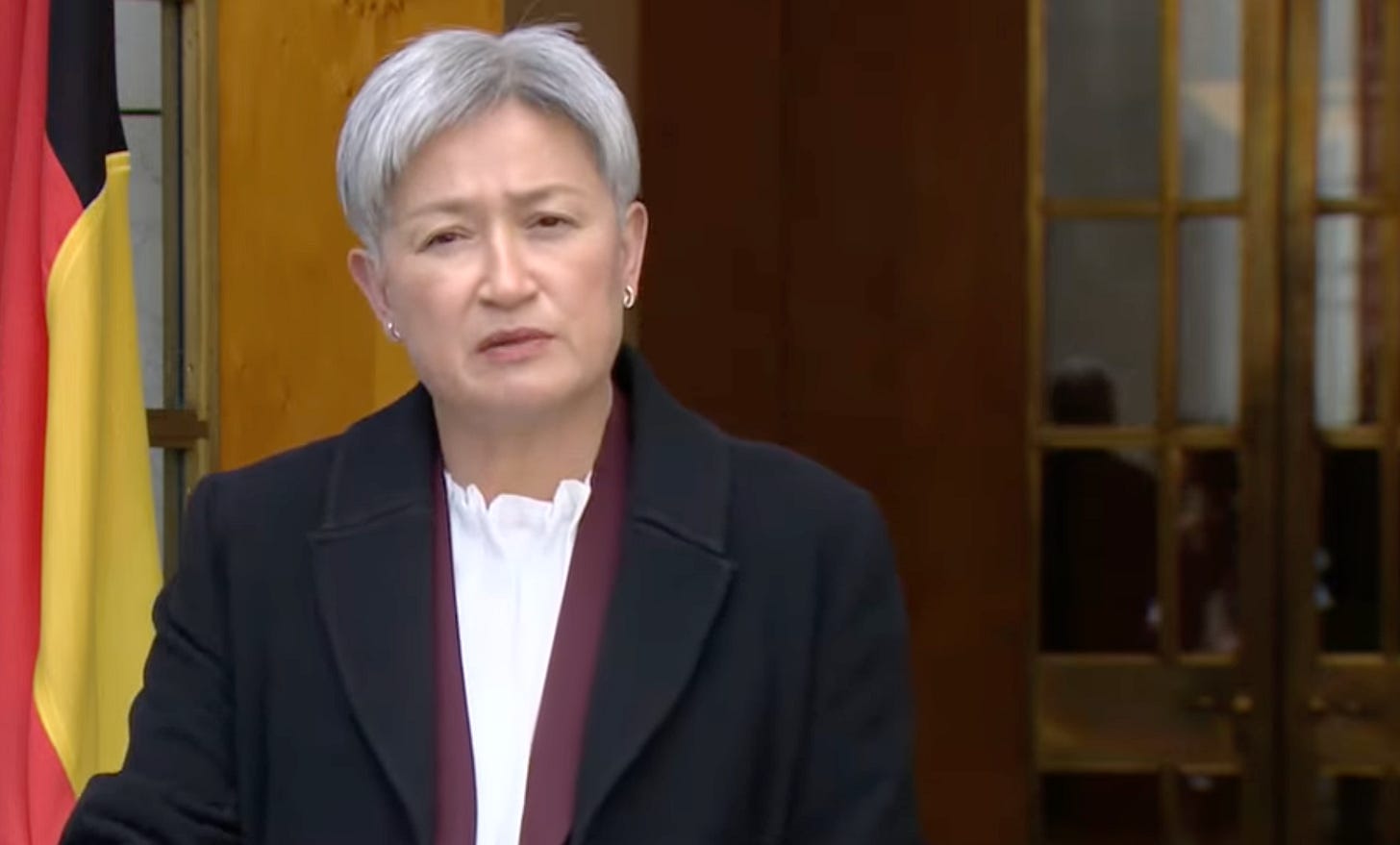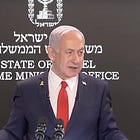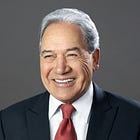Australian PM Announces Palestine Recognition Despite Israeli Opposition
Australia will formally recognize Palestinian statehood at the United Nations General Assembly in September, Prime Minister Anthony Albanese announced Monday, marking a historic shift in the nation's Middle East policy amid ongoing conflict in Gaza.
"Today I can confirm that at the 80th session of the United Nations General Assembly in September, Australia will recognise the state of Palestine," Albanese said during a press conference following a cabinet meeting. "Australia will recognise the right of the Palestinian people to a state of their own."
The announcement positions Australia alongside other Western nations pursuing coordinated diplomatic pressure for a two-state solution. Albanese said he discussed the decision over the past two weeks with British Prime Minister Keir Starmer, French President Emmanuel Macron, New Zealand Prime Minister Christopher Luxon and Japanese Prime Minister Shigeru Ishiba.
The prime minister also spoke directly with Israeli Prime Minister Benjamin Netanyahu last Thursday and Palestinian Authority President Mahmoud Abbas last Tuesday about the recognition plan.
"A two-state solution is humanity's best hope to break the cycle of violence in the Middle East and to bring an end to the conflict, suffering and starvation in Gaza," Albanese said.
Australia's recognition comes with detailed conditions that the Palestinian Authority has committed to meeting, according to Albanese. The commitments include ensuring no role for Hamas in any future Palestinian state, demilitarization of Palestinian territories, holding general elections, and recognizing Israel's right to exist in peace and security.
"Our government has made it clear that there can be no role for the terrorists of Hamas in any future Palestinian state," Albanese said. "This is one of the commitments Australia has sought and received from President Abbas and the Palestinian Authority."
The Palestinian Authority has also pledged to abolish payments to families of prisoners and martyrs, reform governance and education systems with international oversight to prevent incitement of violence, and accept international security forces.
Foreign Minister Penny Wong said the decision follows more than 77 years since the world first promised a Palestinian state. She noted that in April, the government began discussing with Australians about changing the country's approach to Palestinian recognition.
"We made clear we would recognise Palestine when it would best contribute momentum to peace," Wong said. "September is that time."
Truth matters. Quality journalism costs.
Your subscription to The Evening Post (Australia) directly funds the investigative reporting our democracy needs. For less than a coffee per week, you enable our journalists to uncover stories that powerful interests would rather keep hidden. There is no corporate influence involved. No compromises. Just honest journalism when we need it most.
Not ready to be paid subscribe, but appreciate the newsletter ? Grab us a beer or snag the exclusive ad spot at the top of next week's newsletter.
The announcement drew immediate criticism from Netanyahu, who has argued that recognizing Palestinian statehood rewards Hamas. During his call with Albanese, Netanyahu presented arguments "very similar to the arguments that he put more than a year ago," according to the prime minister.
"I was able to say that the arguments that he put to me were very similar to the arguments that he put more than a year ago," Albanese said of his conversation with Netanyahu. "I put the argument to him that we need a political solution not a military one because a military response alone has seen the devastation in Gaza."
Albanese characterized his discussion with Netanyahu as "civil" and lasting longer than typical leaders' calls. The prime minister said he expressed concern about the direction of Netanyahu's government while reiterating Australia's opposition to Hamas as a terrorist organization.
The recognition announcement comes as international pressure mounts on Israel over its conduct in Gaza and expansion of settlements in the West Bank. Albanese directly criticized the Netanyahu government's actions.
"The Netanyahu government is rapidly expanding illegal settlements," Albanese said. "Settler violence in the West Bank has increased. There have been threats to annex the occupied Palestinian territories and proposing the permanent forced displacement of the Palestinian people."
The prime minister said these actions, combined with the humanitarian crisis in Gaza, "risk putting a two-state solution out of reach for a generation."
"The situation in Gaza has gone beyond the world's worst fears," Albanese said. "Far too many innocent lives have been lost. The Israeli government continues to defy international law and deny sufficient aid, food and water to desperate people, including children."
Wong emphasized the global nature of the diplomatic effort, noting that the Arab League has made unprecedented demands for Hamas to end its rule in Gaza and surrender weapons to the Palestinian Authority.
"This is an opportunity to deliver self-determination for the people of Palestine in a way that isolates Hamas, disarms it and drives it out of the region once and for all," Albanese said.
The foreign minister said Australia notified U.S. Secretary of State Marco Rubio about the decision before the announcement "as a matter of diplomatic courtesy." Despite potential opposition from the Trump administration, Wong indicated the decision would not affect other aspects of the U.S.-Australia relationship.
"We speak for Australia and we make our sovereign decisions," Wong said when asked about potential diplomatic blowback.
Australia's practical implementation of recognition will be tied to progress on Palestinian Authority commitments, according to both leaders. They did not provide specific details about establishing diplomatic facilities or converting the Palestinian delegation in Australia to full embassy status.
"The practical implementation of our recognition will be tied to progress on these commitments," Wong said. "We will continue to provide humanitarian aid with our partners to try and help vulnerable civilians to get basic supplies they need."
The announcement comes nearly 16 months after Hamas attacked Israel on October 7, 2023, killing approximately 1,200 people and taking more than 240 hostages. Israel's military response has killed tens of thousands of Palestinians in Gaza, according to health officials there.
"Ever since the atrocities perpetrated by Hamas on 7 October 2023, Australia has stood with the people of Israel and our partners and allies around the world in calling for the release of the hostages," Albanese said. "For the sake of their loved ones and all who share in their pain, we repeat that call today."
Wong acknowledged the ongoing humanitarian crisis affecting both Israelis and Palestinians.
"The world watched in horror the attacks by Hamas on October 7, the worst loss of Jewish lives on a single day since the Holocaust," Wong said. "Hostages are still cruelly held and we want them all released and reunited with their families and loved ones."
She continued: "And the world has watched in horror since, as tens of thousands of Palestinian civilians are killed, thousands starving, the faces of children we cannot forget."
The timing of Australia's announcement follows similar moves by other nations. France, the United Kingdom and Canada have all indicated support for Palestinian statehood recognition as part of broader diplomatic efforts to end the conflict.
Albanese referenced Australia's historical role in Middle East diplomacy, noting that Australia was the first UN member to vote for the 1947 partition plan that created Israel.
"This is the plan Australia was the first member of the United Nations to vote for back in 1947 when we proudly supported the creation of the modern State of Israel as a state for the Jewish people alongside a state for the Palestinian people," he said.
The prime minister emphasized that recognizing Palestinian statehood reinforces rather than undermines Australia's commitment to Israel.
"When we recognise the long-held and legitimate aspirations of the people of Palestine, we are also upholding and strengthening our commitment to the people of Israel and their right to live in freedom, security and safety," Albanese said.
Both leaders stressed that recognition represents the beginning rather than end of efforts to establish a functional Palestinian state. Australia plans to help build Palestinian Authority capacity while working with international partners to hold the authority accountable to its commitments.
The Palestinian Authority has not held elections since 2006, when Hamas won control of Gaza in voting that led to violent conflict with Palestinian Authority forces. Albanese said Australia wants elections "as soon as possible" but acknowledged the challenging circumstances in Gaza.
"Hamas is not just an enemy of Israelis. It's an enemy of the Palestinian people as well," Albanese said, noting Hamas's violent suppression of Palestinian opposition during the current conflict.
When asked whether Australia would revoke recognition if conditions aren't met, officials indicated they expect international community cooperation to ensure compliance.
"Our expectation is the international community will work with all parties to ensure not only that those commitments are adhered to, but there is progress towards two states," Albanese said.
The announcement addresses domestic Australian concerns about the conflict's impact on community harmony. Albanese said Australians want two things: an end to Middle East violence and prevention of conflict affecting Australia's multicultural society.
"They want the killing to stop. They want peace and security in the Middle East," he said. "The second thing they want is that they do not want conflict brought here to Australia. They want a harmonious community, which is what we have."
Australia's decision reflects growing international momentum for Palestinian statehood recognition despite opposition from Israel and the United States. The Netanyahu government has repeatedly argued that unilateral recognition rewards terrorism and undermines incentives for direct negotiations.
Wong dismissed suggestions that the announcement represents merely symbolic action, calling it "a practical contribution towards building momentum."
"This is not Australia acting alone," she said. "What we are seeing is a range of countries engaging in detailed dialogue as well, behind the scenes, if you like, talking about what a piece looks like in the region."
The foreign minister acknowledged the unique role of the United States in Middle East diplomacy while defending Australia's independent decision.
"The US obviously has a unique role in the world and we support President Trump's work to attain a ceasefire for hostage release and for humanitarian relief," Wong said. "Australia has an opportunity now as I've said to contribute to the momentum towards two states which is the way in which the cycle of violence can be broken."
Australia's announcement comes as international efforts continue to secure a ceasefire and hostage release agreement between Israel and Hamas. Albanese said Australia supports immediate ceasefire implementation while noting that Israel's security cabinet recently approved a large-scale offensive in Gaza that runs counter to ceasefire prospects.
The recognition decision reflects Australia's assessment that the status quo has become unsustainable, with Albanese warning against waiting indefinitely for guaranteed success.
"The toll of the status quo is growing by the day and it can be measured in innocent lives," he said. "The world cannot wait for success to be guaranteed. That only means waiting for a day that will never come."
The September timing at the UN General Assembly will provide a global platform for Australia's formal recognition announcement, potentially encouraging other nations to follow suit. The decision represents one of the most significant shifts in Australian foreign policy toward the Middle East conflict in decades.
Both leaders emphasized that sustainable peace requires mutual recognition between Israelis and Palestinians, with Wong concluding that "two states, Israel and Palestine" remains the only viable path forward.
Got a News Tip?
Contact our editor via Proton Mail encrypted, X Direct Message, LinkedIn, or email. You can securely message him on Signal by using his username, Miko Santos.
As well as knowing you’re keeping Mencari (Australia) alive, you’ll also get:
Get breaking news AS IT HAPPENS - Gain instant access to our real-time coverage and analysis when major stories break, keeping you ahead of the curve
Unlock our COMPLETE content library - Enjoy unlimited access to every newsletter, podcast episode, and exclusive archive—all seamlessly available in your favorite podcast apps.
Join the conversation that matters - Be part of our vibrant community with full commenting privileges on all content, directly supporting The Evening Post (Australia)
Not ready to be paid subscribe, but appreciate the newsletter ? Grab us a beer or snag the exclusive ad spot at the top of next week's newsletter.





